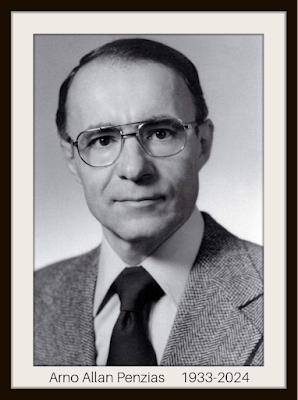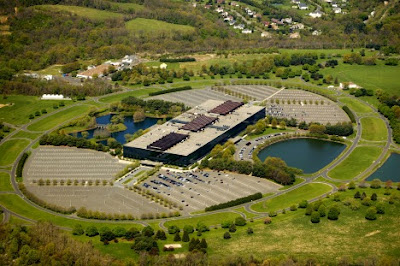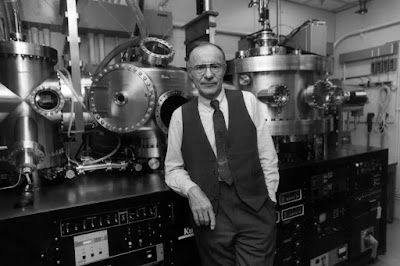Nobel Prize-Winning Physicist: Dr Arno Allan Penzias died a couple of weeks ago - on January 22, 2024 - at the age of 90. His last days were spent in an assisted living facility in San Francisco.
Abq Jew has mentioned Penzias's passing to a few people who did not know who Arno Penzias was or what Arno Penzias did. Abq Jew finds this remarkable - isn't this common knowledge? Doesn't everyone know?
What Arno Penzias did - along with fellow Nobel Prize winner Robert Woodrow Wilson - was to a) identify; and b) explain the cosmic hum, aka the Cosmic Microwave Background.
The universe hums.
We all know why hummingbirds hum, don't we? Because they don't know the words! (A great old dad joke, but not true; here's why.)
So why does the universe hum? (And no, we're not talking about tinnitus, or about the Taos, Auckland, Windsor, or any other Hum.)
The short answer is: the universe hums because of the Big Bang. But Abq Jew knows that you, his loyal readers, will not be satisfied with the short answer.
So let's get technical and let Wikipedia explain:
The cosmic microwave background (CMB or CMBR) is microwave radiation that fills all space in the observable universe.
It is a remnant that provides an important source of data on the primordial universe.
With a standard optical telescope, the background space between stars and galaxies is almost completely dark.
However, a sufficiently sensitive radio telescope detects a faint background glow that is almost uniform and is not associated with any star, galaxy, or other object. This glow is strongest in the microwave region of the radio spectrum.
The accidental discovery of the CMB in 1965 by American radio astronomers Arno Penzias and Robert Wilson was the culmination of work initiated in the 1940s.
CMB is landmark evidence of the Big Bang theory for the origin of the universe.
Dr Penzias (and Dr Wilson) made this CMB discovery while working at Bell Labs in Holmdel, New Jersey.
Where, once upon a time (see April 2018's Fame, Fortune, and Four Wives) Abq Jew worked as a Technical Writer - a Word Man, as he was even then known.
I was born in Munich, Germany, in 1933.
I spent the first six years of my life comfortably, as an adored child in a closely-knit middle-class family. Even when my family was rounded up for deportation to Poland it didn’t occur to me that anything could happen to us.
All I remember is scrambling up and down three tiers of narrow beds attached to the walls of a very large room, and then taking a long train trip. After some days of back and forth on the train, we were returned to Munich.
All the grown-ups were happy and relieved, but I began to realize that there were bad things that my parents couldn’t completely control, something to do with being Jewish.
I learned that everything would be fine if we could only get to “America”.
In the late spring of 1939, shortly after my sixth birthday, my parents put their two boys on a train for England; we each had a suitcase with our initials painted on it, as well as a bag of candy.
They told me to be sure and take care of my younger brother.
I remember telling him, “jetzt sind wir allein (now we are alone)" as the train pulled out.
My mother received her exit permit about a month later (just a few weeks before the war broke out) and was able to join us in England.
My father had arrived in England almost as soon as the two of us, but we hadn’t seen him because he was interned in a camp for alien men.
The only other noteworthy event in the six or so months we spent in England, awaiting passage to America, occurred one morning in a makeshift schoolroom. At that moment, I suddenly realized that I could read the open page of the (English) school book I had been staring at.
We sailed for America toward the end of December 1939 on the Cunard liner Georgic – using tickets that my father had foresightedly bought in Germany a year and half earlier.
The ship provided party hats and balloons for the Christmas and New Year’s parties, as well as lots of lifeboat drills. The grey three-inch gun on the aft deck was a great attraction for us boys.
We arrived in New York in January of 1940 ....
One might think that Arno Penzias's story would be best told by Arno Penzias himself. But the Kindertransport story might be better told by Katie Sanders of National Geographic. Who begins:
How a stranger’s kindness during WWII helped give us the Big Bang theory
German-born physicist Arno Penzias escaped the Holocaust with the help of a benefactor he never met. That secret act of generosity changed his life—and our understanding
On the eve of World War II, the owner of a Belleville, New Jersey, paint shop got a frantic knock on his door. It was a 28-year-old German immigrant named Leo Gelbart, who’d been going door to door, appealing to members of the town’s Jewish community.
“This family needs to get out of Germany, and I don’t have enough money to help. Can you?” Gelbart asked. He showed the store owner a black-and-white photograph of his friends back in Munich: a handsome couple named Karl and Justine Penzias, holding their sons Arno and Guenther, six and four.
With German Chancellor Adolf Hitler’s Nazi regime increasingly persecuting and interning Jews, the Penzias family had to flee or face a concentration camp.
But to immigrate to America, they needed to secure several affidavits of support — official documents vouching that they had a relative and a financial safety net in the United States.
Gelbart would provide the first, falsely stating that his friend Karl Penzias was his cousin. But as a waiter, he didn’t have enough money to qualify as the family’s sponsor.
He was trying to find someone to sign the second affidavit taking on the Penziases as dependents in case of need.
The 52-year-old paint merchant said yes, he would help. “I’ll be glad to support them until they become self-supporting,” he wrote on the affidavit.
From Germany, a deeply grateful Karl Penzias gave this stranger his word, via his friend, that his family only needed support on paper and would show their gratitude by never contacting him.
The story gets better:
In 1939, as they scrambled to make arrangements to leave Germany for America, Arno's parents sent their young sons to England as part of the Kindertransport, a British rescue effort that transported 10,000 mostly Jewish children out of Nazi territory.
The brothers bounced around from an all-girls London orphanage to different English foster families. As Nazis accelerated Hitler’s murderous campaign that would give birth to the word “genocide,” Karl and Justine Penzias, equipped with the necessary paperwork, eventually reunited with their sons in England and set out for the U.S. by boat.
The family dodged hurricanes and German submarines on their journey across the Atlantic. On January 3, 1940, as their ship docked in New York City, journalists snapped photographs of Arno and Guenther, wide-eyed young refugees waving to the Statue of Liberty.
And then the story - as told by Katie Sanders - gets even better:
But thanking the man whose signature opened the door to America wasn’t feasible. Arno’s father had promised never to contact the signer of the affidavit, and he kept his word. The details regarding their helper remained a mystery.
Then, in 2012, Arno’s son David Penzias found an envelope in some family papers.
This is why the universe hums.









No comments:
Post a Comment